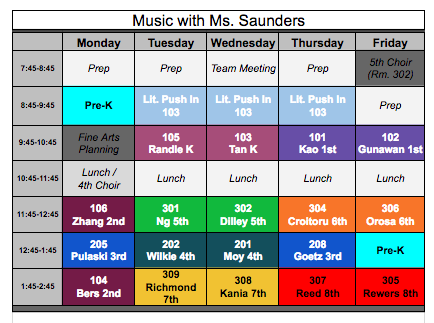Quarter One Overview
Kindergarten / 1st Grade
Unit Topic: Exploring Steady Beat and Pulse
Students explore and discover the concept of steady beat and pulse as we use our bodies classroom instruments to explore rhythm. Students engage in rhythm games, creative movement, and poetry to reinforce steady beat. By the end of the unit students will be able to independently initiate and maintain a steady beat.
2nd Grade / 3rd Grade
Unit Topic: Pathways to Improvisation
Students explore simple improvisation activities using speech, singing, listening and creative movement. Students explore rhythmic improvisation with through speech and clapping games, developing their sense of meter and pulse. By the end of this unit students will be able to improvise four-beat rhythms and simple melodies.
4th Grade / 5th Grade
Unit Topic: Rhythm Compositions
Students explore rhythmic speech, vocal expression, and beat divisions through a drum piece titled: “Whadja have for lunch?”. Students develop their ability to perform as an ensemble in multiple parts, demonstrating rhythmic accuracy. As a class, students review rhythms learned in previous grades and experience and discover a new beat division; 16th notes. By the end of this unit, students will create and perform 8 beat rhythm compositions, to be used as a springboard for improvisation on pitched instruments.
6th Grade / 7th Grade / 8th Grade
Unit Topic: Canon Compositions
Students explore the concept of teamwork and the role of a musician as part of an ensemble. Students apply their knowledge of rhythm writing and meter to compose a 16 beat rhythm canon for drums. Through engaging in small group work, students develop the ability to compose music collaboratively, analyze musical performances, and make musical decisions as a composer. Students understanding of the canon form is also reinforced through a xylophone piece. By the end of this unit, students will be able to create and perform a 16 beat rhythm canon with a small group and perform a melody canon on xylophones.
MUSIC GRADING POLICY:
Students earn grades in music through music skill assessments and performance tasks. Students also earn music citizenship grades, outlined below.
WEIGHTING:
40%: Formative Assessment Grades
- Essential music skills assessed throughout the year such as pitch matching, rhythm reading, rhythm dictation, etc.
- Self Assessments
- Music Citizenship
- Daily Exit Slips
50%: Summative Assessments
- Performance tasks that assess learning from each unit
- Small group and individual music performances
- Written music compositions (as appropriate by grade level)
Homework (if given) is worth 10% of students' grades.
*** Students earn up to two points for meeting each of the following expectations for Music Citizenship ***
- Silent entry and focus during warm up
- 100% effort in each activity
- Being respectful and encouraging of others
- Listening actively; engaging in learning by making eye contact and contributing to the group
- Regulating your own behavior and taking responsibility for your actions
Music Class Schedule:
